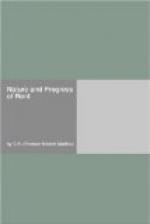When capital has accumulated, and labour fallen on the most eligible lands of a country, other lands less favourably circumstanced with respect to fertility or situation, may be occupied with advantage. The expenses of cultivation, including profits, having fallen, poorer land, or land more distant from markets, though yielding at first no rent, may fully repay these expenses, and fully answer to the cultivator. And again, when either the profits of stock or the wages of labour, or both, have still further fallen, land still poorer, or still less favourably situated, may be taken into cultivation. And, at every step, it is clear, that if the price of produce does not fall, the rents of land will rise. And the price of produce will not fall, as long as the industry and ingenuity of the labouring classes, assisted by the capitals of those not employed upon the land, can find something to give in exchange to the cultivators and landlords, which will stimulate them to continue undiminished their agricultural exertions, and maintain their increasing excess of produce.
In tracing more particularly the laws which govern the rise and fall of rents, the main causes which diminish the expenses of cultivation, or reduce the cost of the instruments of production, compared with the price of produce, require to be more specifically enumerated. The principal of these seem to be four: first, such an accumulation of capital as will lower the profits of stock; secondly, such an increase of population as will lower the wages of labour; thirdly, such agricultural improvements, or such increase of exertions, as will diminish the number of labourers necessary to produce a given effect; and fourthly, such an increase in the price of agricultural produce, from increased demand, as without nominally lowering the expense of production, will increase the difference between this expense and the price of produce.
The operation of the three first causes in lowering the expenses of cultivation, compared with the price of produce, are quite obvious; the fourth requires a few further observations.
If a great and continued demand should arise among surrounding nations for the raw produce of a particular country, the price of this produce would of course rise considerably; and the expenses of cultivation, rising only slowly and gradually to the same proportion, the price of produce might for a long time keep so much ahead, as to give a prodigious stimulus to improvement, and encourage the employment of much capital in bringing fresh land under cultivation, and rendering the old much more productive.
Nor would the effect be essentially different in a country which continued to feed its own people, if instead of a demand for its raw produce, there was the same increasing demand for its manufactures. These manufactures, if from such a demand the value of their amount in foreign countries was greatly to increase, would bring back a great increase of value in return, which increase of value could not fail to increase the value of the raw produce. The demand for agricultural as well as manufactured produce would be augmented; and a considerable stimulus, though not perhaps to the same extent as in the last case, would be given to every kind of improvement on the land.




